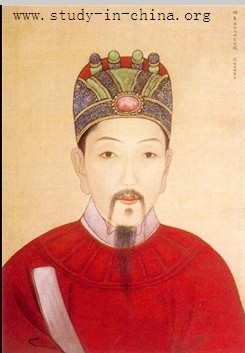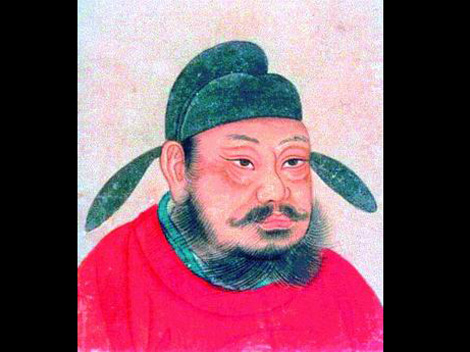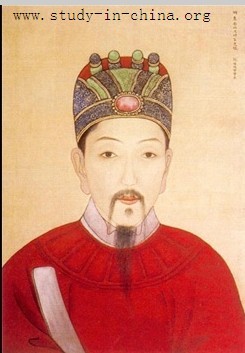Top 10 Famous Generals of Ancient China

Ten most famous Generals in ancient China are:
#10 Yuan Chonghuan 袁崇焕
Yuan Chonghuan (1584-1630), also known as Yuansu and Zi Ru, was a famed politician and military commander of the late Ming Dynasty, who battled the Later Kin
in Liaoning. He was born in Dongguan, Guangdong Province, on June 6, 1584. During his adolescence, Yuan spent time travelling from town to town, and befriended many foreigners along the way. In 1619, he passed the imperial examinations and was appointed to the minor post of magistrate in Shaowu County in south China's Fujian.
Yuan Chonghuan was later known to have excelled in artillery warfare, and was in charge of guarding Shanhai Pass and eastern Liaoning. His military career reached its pinnacle when he defeated Nurhaci and the Manchu army in the Battle of Ningyuan. Nurhaci's son and successor, Huang Taiji, was also defeated by him in the Battle of Ningjin.
However, General Yuan was a tragic figure. He was executed by the emperor on uncertain charges. Without much evidence, he was accused of collusion with the enemy and other charges, and was condemned to "death by a thousand cuts" at Ganshiqiao in Beijing on September 22, 1630. Local people at that time all thought that he colluded with the enemy, so they hated him very much, but now many scholars believe that the truth remains a mystery still to be uncovered.

Qi Jiguang was best remembered for and most credited with his courage and leadership in the fight against the Japanese Wokou pirates along the southeast coast of China in over 80 wars for more than ten years, as well as his reinforcement work on the Great Wall of China to guard the borders for peace. Although he wasn't the only general involved in the effort, many historians regarded him as the one who contributed the most. Historians also held that Wokou interference ended during his lifetime. He died of illness on January 5, 1588, after he resigned and returned to his hometown.
Not only a brilliant general, Qi Jiguang also left behind invaluable practical experience in two books on military strategy – "Ji Xiao Xin Shu" (New Book of Efficiency) and "Lian Bing Shi Ji" (Record of Military Training). He also wrote a great number of poems and prose, which were compiled into the "Collection of Zhizhi Hall."

At the age of 30, Yue Fei supposedly wrote his most famous poem "Man Jiang Hong," which was a great encouragement for his army and still inspires people today. The army he led was called the "Yue Army" and there was a popular saying among the people: "It's easy to shake a mountain, but it's not easy to shake the Yue Army." This was the highest appraisal for the army led by Yue.
On January 27, 1142, Yue was poisoned to death in prison in Hangzhou by Chancellor Qin Hui after being accused of false charges. However, 21 years later, Emperor Xiaozong of the Song ascended the throne, and ordered the rehabilitation of General Yue's reputation. The emperor decreed that Yue's tomb be built near Hangzhou's West Lake.

Because of his great achievements, he was reputed to be one of the greatest generals in Chinese history and was regarded as the best general in East Asia during his lifetime. He continued to command his army and fight battles until he was 84 years old. Because of his military talent, the Tang Empire maintained peace for more than two decades.
Tang Emperor Dezong was very sad about Guo's death on July 9, 781, and gave an edict to mourn his general and appraised his deeds. As a historical figure of high prestige and reputation, Guo was respected by the whole nation.

Li Guang (?-119 BC), born in Longxi (in today's Gansu), was a famous general of the Han Dynasty. Nicknamed the "Flying General" by his Xiongnu enemies, he fought primarily in the campaigns against Xiongnu to the north of the Han Empire. He became known to the Xiongnu as a tough opponent. His appearance at various battles scared away Xiongnu troops who dared not to come back again for many years.
Li was tall and strong, with long arms, and good at archery. It was said that his arrows could penetrate stone. His descendants learned shooting skills from him, but none of them could surpass their teacher.
In the Battle of Mobei in 119 BC, General Li failed to arrive at the battlefield in time because he got lost in the desert. He committed suicide shortly after the battle. He was mourned by his entire army and many civilians.

Born in Huanyin (today's Huai'an, Jiangsu Province), Han Xin (c. 231-196 BC) was an outstanding military general, strategist and military theory master. He served Liu Bang (Emperor Gaozu of the Han) during the Chu-Han contention period and contributed greatly to the founding of the Han Dynasty. Han was known as one of the "Three Heroes of the early Han Dynasty", along with Zhang Liang and Xiao He.
Han is best remembered as a brilliant military commander for the strategies and tactics he employed in warfare, some of which have become the origins of certain Chinese idioms. In recognition of Han's contributions, Liu conferred on him the titles of "King of Qi" and "King of Chu." However, Liu gradually
reduced Han's military power later, out of envy of his extraordinary abilities, demoting him to "Marquis of Huaiyin." Finally, Han was accused of participating in a rebellion and was killed in 196 BC.

Xiang Yu (232–202 BC), born in Xiaxiang (in today's Jiangsu Province), was a prominent military commander and politician during the late Qin Dynasty period.
As a leader of the famous Huiji Rebellion against the Qin Empire, he is the epitome of bravery in Chinese military history.
Following his uncle Xiang Liang, Xiang Yu started the Kuaiji Rebellion to fight against the Qin. He led the Chu rebel forces to destroy the main forces of the Qin armies at the Battle of Julu in 207 BC. After the fall of the Qin Dynasty, Xiang Yu proclaimed himself the "King of Western Chu" and ruled a vast area of land covering nine counties of Liang and Chu along the lower reaches of Yellow River and Yangtze River, which were located in parts of today's Shanxi, Henan, Hubei, Hunan and Jiangsu, with Pengcheng (today's Xuzhou, Jiangsu Province) as his capital.
Xiang Yu was later engaged in the struggles known as the Chu–Han contention period, for power with Liu Bang, founder of the Han Dynasty. He was eventually defeated by Liu and committed suicide on the bank of the Wujiang River (in today's Anhui Province) in 202 BC.

Sun Bin (? - 316 BC), a descendant of Sun Tzu, also known as Sun Boling, was a military strategist who lived in the State of Qi during the Warring States Period in Chinese history. Sun was tutored in military strategy with another student, Pang Juan, with the hermit Guiguzi in his early years. They became good friends, but Pang was secretly jealous of Sun, because he perceived that Sun Bin was more talented and had learned more about military strategy from their teacher than he did.
After Pang became a military general of the State of Wei, he pretended to invite Sun to work with him, but then had Sun's kneecaps removed. Sun later escaped from Wei and rose to prominence in the State of Qi, by serving as a military strategist and commander. He led Qi troops to defeat Wei at the battles of Guiling and Maling.
Sun authored the military treatise "Sun Bin's Art of War," which was lost for almost 2,000 years, but its bamboo strips with more than 11,000 words were discovered in an archaeological excavation in Linyi, Shandong Province, in 1972.

Skilled in army commanding and military strategy, Wu served the states of Lu and Wei in succession. In the State of Wei, he directed many great battles and became Xihe Shou (Mayor of Xihe County). Later, after he was estranged from his lord, Wu Qi went to the State of Chu where he was appointed Prime Minister by King Dao of Chu. His reforms made Chu a strong state at that time. The reforms he instituted enraged the old nobility in Chu, and he was killed following the death of King Dao of Chu.
Wu was a person of controversy. He was blamed for not returning home to mourn his mother after she died, and accused for murdering his own wife (who was the daughter of a noble from the rival State of Qi) in order to win trust from the ruler of the State of Lu. It is uncertain whether these charges were true or whether they were created by his political enemies to slander him.
His military work, "Wuzi," was included in the collection "Seven Military Classics." He and Sun Wu are often mentioned equally as China's greatest military strategists.

Sun was general under King Helv of the State of Wu. Leading the Wu army composed of 60,000 soldiers, Sun miraculously defeated the State of Chu which had 200,000 soldiers in five wars and occupied Ying, the capital of Chu.
His most famous work, "The Art of War," composed of 13 chapters, was the first as well as the most influential ancient Chinese book on military strategy. It was included in the first book of the collection of "Seven Military Classics." Sun had a significant impact on Chinese and Asian history and culture. During the 19th and 20th centuries, his "The Art of War" became very popular and was in practical use in Western world. It has been translated to multiple languages including English, French, German and Japanese, and has continued to influence both Asian and Western cultures and politics, becoming the most famous book on military strategy in the world.
News&Opinion
 more
more- China Sends Equipment Aid to Egyptian School
- Panda Cubs Big Draw for Tourists to Sichuan
- China, India Hold Strategic Dialogue to Boost Ec...
- China, Russia Pledge to Further Military Coopera...
- Australia's Victoria State Premier Makes first O...
- CCTV Mid-Autumn Festival Gala Held in Jiangmen, ...
- Int'l Tourism Festival Opens in Beijing
- China backs NTC in Representing Libya at UN
Policy&Laws
China Lends Helping Hand to Cash-strapped Small ...
The State Council, or China's Cabinet, on Wednesday took a new appro...
China Will Continue to Swim with Tide of Times
The rise of China is the definitive economic and political story of ...





 print
print  email
email  Favorite
Favorite  Transtlate
Transtlate 







